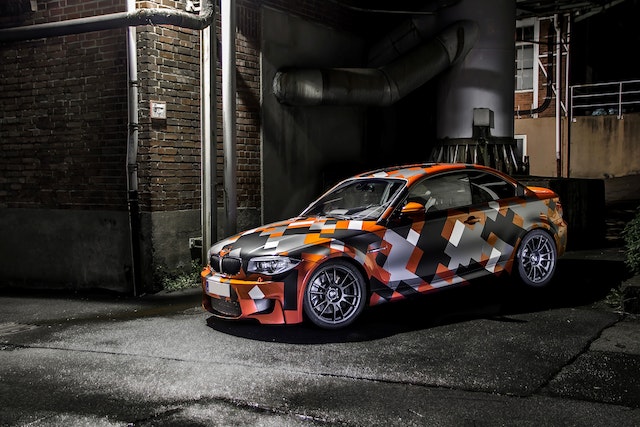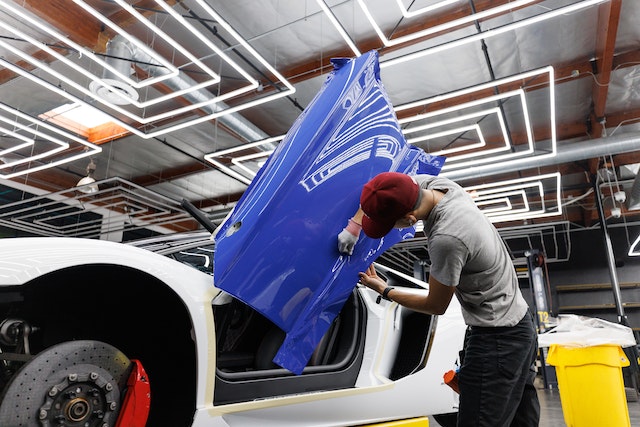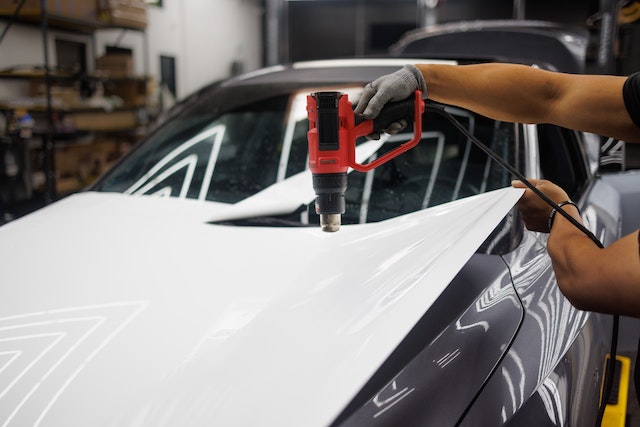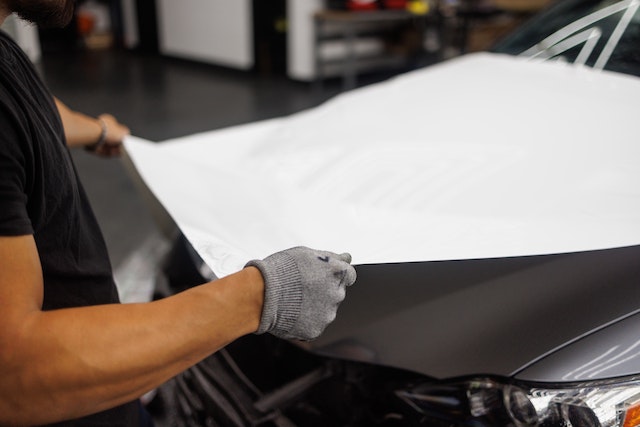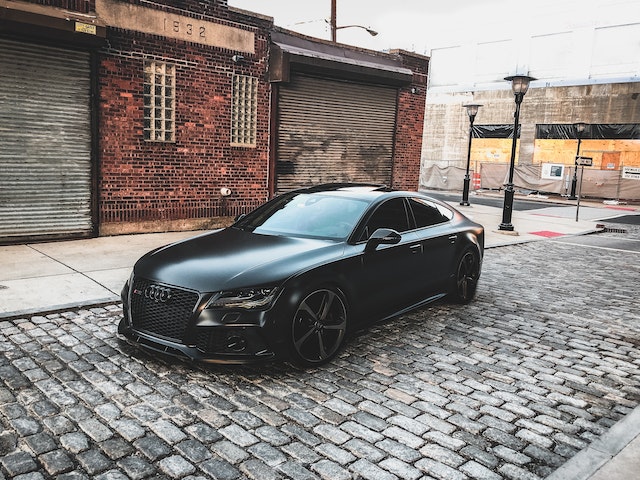Car wrapping is an increasingly popular way to give a vehicle a new look without the expense and permanence of a paint job. Car wrapping involves applying a vinyl film to the exterior of a car, which can come in a variety of colors and finishes. While car wrapping can be a great way to personalize a vehicle, many people wonder about the cost.
The cost of car wrapping can vary widely depending on a variety of factors. The size and type of vehicle, the type of vinyl film used, and the complexity of the design can all influence the cost. In general, a basic car wrap can cost anywhere from $1,000 to $5,000, while a more complex design can cost upwards of $10,000. However, the cost of car wrapping can be well worth it for those looking for a unique and eye-catching vehicle.
Key Takeaways
- Car wrapping is a popular alternative to paint jobs for those looking to personalize their vehicles.
- The cost of car wrapping can vary widely depending on factors such as vehicle size, vinyl film type, and design complexity.
- While car wrapping can be expensive, it can be a worthwhile investment for those looking to create a unique and attention-grabbing vehicle.
The Concept of Car Wrapping
Car wrapping is a process that involves covering a vehicle’s original paint with a vinyl wrap. This technique is an alternative to a traditional paint job and is becoming increasingly popular among car owners. Car wrapping offers a range of benefits, such as protection against minor scratches and UV rays, as well as the ability to change the color and look of the car without committing to a permanent paint job.
The vinyl wrap is applied to the car’s exterior in large sheets, which are then carefully trimmed to fit the contours of the vehicle. The vinyl wrap can be customized with a variety of colors, patterns, and finishes, including matte, gloss, metallic, and textured. Car wrapping can also include additional graphics and designs, such as company logos or advertising.
The cost of car wrapping can vary depending on factors such as the size and type of vehicle, the complexity of the design, and the quality of the vinyl wrap. Typically, a full car wrap can cost anywhere from $2,500 to $5,000, while a partial wrap can cost between $1,000 and $3,000. However, prices can be higher for luxury vehicles or complex designs.
It’s important to note that car wrapping is not a permanent solution, and the vinyl wrap will eventually need to be replaced. The lifespan of a vinyl wrap can vary depending on factors such as the quality of the vinyl, the climate, and how well the vehicle is maintained. On average, a vinyl wrap can last between three to five years.
Overall, car wrapping is a popular and cost-effective way to change the look of a vehicle without committing to a permanent paint job. With a range of colors, patterns, and finishes available, car wrapping offers a customizable and unique option for car owners looking to personalize their vehicles.
Types of Car Wraps
Car wraps come in various types, each with its unique features and costs. In this section, we will discuss the most common types of car wraps available in the market.
Vinyl Wrap
Vinyl wrap is the most common type of car wrap. It is made of high-quality vinyl material that can be easily applied to the surface of a car. Vinyl wrap comes in various colors, patterns, and finishes, including matte, gloss, and metallic. Vinyl wrap is an affordable option that can protect the original paint of the car from scratches and other damages.
Matte Finish
Matte finish car wraps have a non-glossy, satin-like finish that gives a unique look to the car. Matte finish wraps are available in various colors and can be customized to meet the specific needs of the customer. Matte finish wraps are more expensive than vinyl wraps due to the specialized materials and installation required.
Metallic Color
Metallic color car wraps are a popular choice for car enthusiasts who want a unique and eye-catching look for their cars. Metallic color wraps are available in various shades and can be customized to match the customer’s preferences. Metallic color wraps are more expensive than vinyl wraps due to the specialized materials and installation required.
Carbon Fiber
Carbon fiber car wraps are a high-end option that gives the car a sporty and luxurious look. Carbon fiber wraps are made of a special material that mimics the look and texture of real carbon fiber. Carbon fiber wraps are more expensive than other types of car wraps due to the specialized materials and installation required.
Chrome Treatments
Chrome treatments are a popular option for luxury cars and exotic vehicles. Chrome wraps are made of a reflective material that gives the car a shiny and reflective finish. Chrome wraps are more expensive than other types of car wraps due to the specialized materials and installation required.
Exotic Wrap
Exotic wraps are custom-designed wraps that can be created to match the customer’s specific preferences. Exotic wraps can include unique designs, patterns, and finishes that are not available in other types of car wraps. Exotic wraps are the most expensive type of car wrap due to the specialized materials and installation required.
In conclusion, car wraps come in various types, each with its unique features and costs. Customers should choose a car wrap that meets their specific needs and budget.
Car Wrap Costs
When it comes to car wraps, the cost can vary depending on a number of factors. Some of the main factors that can influence the cost of a car wrap include the size of the vehicle, the complexity of the design, and the type of material used.
Material Costs
The cost of the material used for a car wrap can vary depending on the type of material used. Some of the most common types of materials used for car wraps include vinyl, chrome, and matte. Vinyl is the most popular material used for car wraps due to its durability and versatility. Chrome and matte wraps are also popular, but they tend to be more expensive than vinyl wraps.
Labor Costs
The labor costs associated with a car wrap can also vary depending on the complexity of the design and the size of the vehicle. In general, the more intricate the design, the more time it will take to install the wrap, which can increase the labor costs. The size of the vehicle can also impact the labor costs, as larger vehicles will generally require more time and effort to wrap.
Wrap Costs
The cost of wrapping a car can vary depending on the type of wrap used and the size of the vehicle. In general, a full wrap will cost more than a partial wrap, as it requires more material and labor to complete. The cost of a car wrap can range from a few hundred dollars for a basic wrap to several thousand dollars for a high-end, custom wrap.
Overall, the cost of wrapping a car can vary depending on a number of factors. It is important to do your research and get multiple quotes from different providers to ensure that you are getting a fair price for your car wrap.
Factors Influencing Car Wrap Costs
Car wrapping is an excellent way to give your vehicle a unique look while also protecting its original paintwork. The cost of wrapping a car varies depending on several factors, including the make and model of the vehicle, its condition, the coverage required, unique features, labor and installation, durability, and warranty.
Vehicle Make and Model
The make and model of a vehicle significantly influence the cost of wrapping it. Four-door sedans, SUVs, and trucks are generally cheaper to wrap than high-end cars. High-end cars require special attention to detail, and the cost of materials and labor is often higher.
Vehicle Condition
The condition of a vehicle also affects the cost of wrapping it. If a car has scratches, dents, dings, corrosion, or other imperfections, the cost of wrapping it may increase. The wrap may need to cover these imperfections, which requires more material and labor.
Wrap Coverage
The amount of coverage required also affects the cost of wrapping a car. A partial wrap that covers only certain areas of the vehicle is less expensive than a full vehicle wrap that covers the entire car. Wrapping taillights, headlights, and bumper covers also adds to the cost.
Unique Features
If you want graphics, vinyl decals, or other unique features on your car wrap, the cost will increase. These features require more material and labor to create the desired effect.
Labor and Installation
The labor and installation costs of wrapping a car vary depending on the complexity of the application process. Removing the bumpers and other parts of the vehicle may be necessary, adding to the cost. The application process requires skill and experience, which also affects the cost.
Durability and Warranty
The durability and warranty of a car wrap affect the cost. A more durable wrap may cost more initially, but it will last longer and provide better protection for your vehicle. A warranty also adds to the cost, but it provides peace of mind knowing that any issues with the wrap will be covered.
In conclusion, the cost of wrapping a car varies depending on several factors, including the make and model, vehicle condition, wrap coverage, unique features, labor and installation, durability, and warranty. It is essential to consider these factors when deciding to wrap your car and to work with a professional who can provide a detailed estimate.
Pros and Cons of Car Wrap vs Paint Job
When it comes to changing the color of a car, there are two options: car wrap or paint job. Each option has its own pros and cons that should be considered before making a decision.
Car Wrap
A car wrap is a vinyl material that is applied to the surface of a car. It can be customized with various designs and colors, and it can also be easily removed without damaging the original paint job. Here are some pros and cons of car wraps:
Pros
- Customizable: Car wraps offer a wide range of design and color options, making it easy to create a unique look for a car.
- Protection: Car wraps can protect the original paint job from scratches, UV rays, and other environmental factors.
- Cost-effective: Car wraps are generally less expensive than a full paint job.
Cons
- Surface area: Car wraps cannot be applied to damaged or rusted surfaces, so the car must be in good condition before a wrap can be applied.
- Limited lifespan: Car wraps have a lifespan of 3-5 years, after which they will need to be replaced.
- Color options: Car wraps have limited color options compared to a full paint job.
Paint Job
A paint job involves repainting the entire car with a new color. It can be customized with any color, but it is more expensive and time-consuming than a car wrap. Here are some pros and cons of a paint job:
Pros
- Unlimited color options: A paint job can be customized with any color or design.
- Long-lasting: A paint job can last up to 10 years with proper care.
- Surface area: A paint job can be applied to damaged or rusted surfaces, making it a good option for older cars.
Cons
- Cost: A paint job is generally more expensive than a car wrap.
- Time-consuming: A paint job can take several days to complete, during which time the car cannot be used.
- Limited customization: A paint job cannot be easily removed or changed, so the color and design must be carefully chosen.
Overall, both car wraps and paint jobs have their own advantages and disadvantages. It’s important to consider the condition of the car, the desired color and design, and the budget before making a decision.
DIY Car Wrapping
For those who are looking to save money on car wrapping, a DIY approach is an option. However, it requires patience, attention to detail, and a willingness to learn.
The first step is to purchase the necessary materials, including vinyl wrap, a heat gun, and a squeegee. It is also recommended to purchase a shrink-wrap gun to ensure a tight and seamless finish.
Before beginning the wrapping process, it is important to thoroughly clean the car and remove any debris or contaminants. This will help ensure a smooth and even application of the vinyl wrap.
Next, the vinyl wrap should be carefully measured and cut to fit the specific areas of the car. It is important to take the time to ensure accurate measurements and cuts to avoid any unnecessary waste of materials.
Once the vinyl wrap is cut to size, it can be applied to the car using a combination of heat and pressure. The heat gun will help to soften the vinyl wrap and make it more pliable, while the squeegee will help to smooth out any wrinkles or air bubbles.
It is important to take breaks and step back to assess the progress and ensure that the vinyl wrap is being applied evenly and smoothly. Any mistakes or imperfections can be corrected by carefully lifting and reapplying the vinyl wrap.
In conclusion, DIY car wrapping can be a cost-effective option for those who are willing to invest the time and effort required. With patience and attention to detail, a professional-looking finish can be achieved.
Care and Maintenance of Car Wraps
Car wraps are a great way to protect and customize your vehicle’s appearance. However, they require proper care and maintenance to ensure they last as long as possible. Here are some tips for keeping your car wrap in pristine condition:
Care Requirements
To keep your car wrap looking its best, it’s important to wash it regularly. Use a mild detergent and a soft sponge or cloth to avoid scratching the surface. Avoid using high-pressure washers, as they can damage the wrap.
High Temperatures
Car wraps can handle high temperatures, but it’s important to avoid exposing them to excessive heat for extended periods. This can cause the wrap to shrink or warp, which can lead to unsightly bubbling or peeling. If you live in a hot climate, try to park your car in the shade as much as possible.
Salt
If you live in an area that experiences snow and ice, your car may be exposed to salt on the roads. Salt can be corrosive and can damage your car wrap over time. To prevent this, wash your car regularly during the winter months.
Bodywork
If your car wrap is damaged, it’s important to get it repaired as soon as possible. This will prevent further damage and ensure that your car looks its best. If you notice any scratches or dents on your car, take it to a professional body shop for repairs.
Overall, car wraps are a great way to protect and customize your vehicle. With proper care and maintenance, your car wrap can last for many years and keep your car looking its best.
Final Thoughts
When it comes to wrapping a car, the cost can vary depending on a variety of factors. However, it is important to keep in mind that the cost of the wrap is just one part of the overall expense. Other factors such as the quality of the wrap, the size of the vehicle, and the complexity of the design can all impact the final cost.
It is also worth noting that not all wraps are created equal. Some companies may use lower quality materials or rush the installation process to cut costs, but this can result in a subpar final product. It is important to choose a reputable company that uses high-quality materials and takes the time to do the job right.
One such company is Avery Dennison, a leader in the vinyl wrap industry. They offer a variety of high-quality vinyl films that are designed to last for years and resist fading and peeling. While their products may be slightly more expensive than some of their competitors, the quality and durability make them a worthwhile investment.
Overall, the cost of wrapping a car can range from a few hundred to several thousand dollars. It is important to do your research, choose a reputable company, and consider the long-term value of a high-quality wrap.
Frequently Asked Questions
What factors affect the cost of car wrapping?
The cost of car wrapping can vary depending on several factors. The size of the vehicle, the complexity of the design, the type of material used, and the location of the installation can all affect the cost. Generally, larger vehicles like SUVs and trucks will cost more to wrap than smaller cars. Additionally, more intricate designs will require more time and effort to install, which can increase the cost.
How long does a car wrap typically last?
The lifespan of a car wrap can vary depending on several factors, including the quality of the material used, the conditions in which the vehicle is stored, and how well the wrap is maintained. Generally, a high-quality car wrap can last anywhere from three to seven years. However, factors such as exposure to sunlight, extreme temperatures, and harsh weather conditions can cause the wrap to deteriorate more quickly.
Are there any DIY car wrapping options available?
While there are DIY car wrapping kits available, it is generally not recommended to attempt to wrap a car yourself unless you have experience with the process. Car wrapping requires specialized tools and techniques to ensure that the wrap is applied evenly and without any bubbles or wrinkles. It is typically best to leave car wrapping to professionals who have the necessary skills and equipment.
What are some popular car wrap color options?
Car wraps are available in a wide range of colors and finishes, including matte, gloss, metallic, and chrome. Some popular color options include matte black, glossy white, and metallic silver. Additionally, some car wrapping companies offer custom color options, allowing you to create a unique look for your vehicle.
Is car wrapping cheaper than painting?
In general, car wrapping is a more affordable option than painting a vehicle. While the cost of car wrapping can vary depending on several factors, it is typically less expensive than a high-quality paint job. Additionally, car wrapping can be done more quickly than painting, which means less downtime for your vehicle.
What is the average cost of car wrapping in San Jose?
The cost of car wrapping in San Jose can vary depending on several factors, including the size of the vehicle, the complexity of the design, and the type of material used. However, on average, car wrapping in San Jose can cost anywhere from $2,000 to $5,000. It is important to get a quote from a reputable car wrapping company to get an accurate estimate for your specific vehicle and design.

